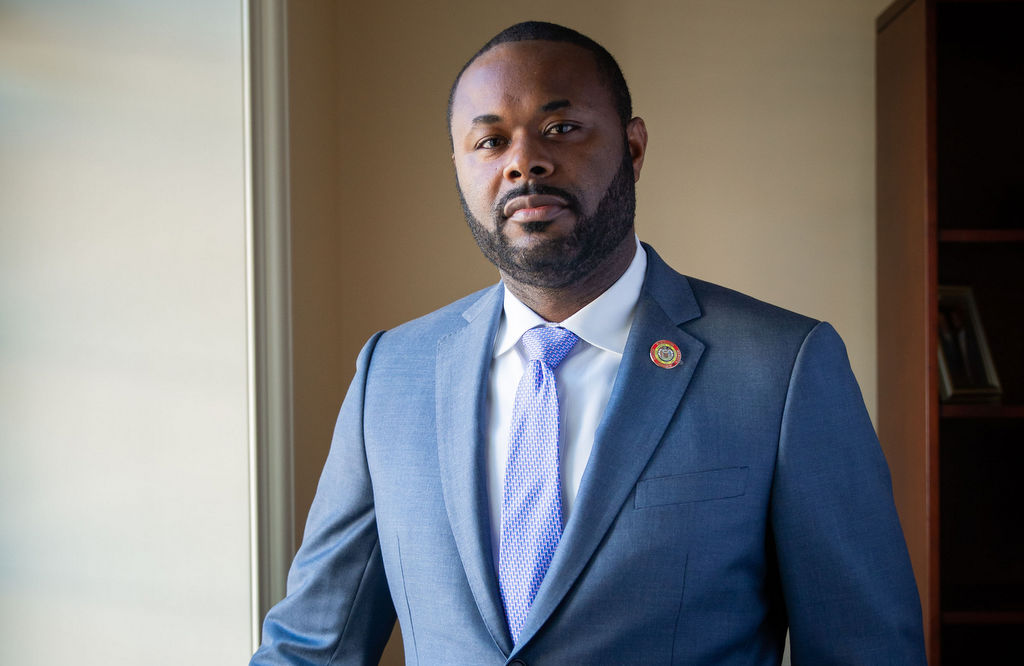[ad_1]
By Sen. Cory McCray
This year, I am taking on the contentious issue of striking the appropriate balance between much-needed behavioral health programs and the overall wellbeing of our communities. Doing so requires ensuring that our behavioral health partners are respectful of the communities that they will be integrating into. A basic function of respect, in cases like this, can be letting the community know when a behavioral health organization is looking at a community or planning to move into a community. My firm belief is that while a community may ultimately agree or disagree with the addition of the facility, they still have the right to be notified.
To be frank, this was an issue that I had to educate myself on over the past year. Like many of my neighbors, I, too, have seen the challenges that we face at intersections like Belair Road and North Avenue, and in neighborhoods like Belair Edison and Station North. As a legislator, I knew it was important to increase my own knowledge about behavioral health programs and the best practices for ingratiating them into existing communities. My education has included calling a meeting with Behavioral Health System Baltimore (BHSB) as well as working alongside our local, state, and federal partners to have a better understanding of the Americans with Disabilities Act, as well as local zoning and licensing requirements. Since that time, we have received a firm commitment from the BHSB that they will alert elected officials immediately when they become aware of an interested behavioral health organization. This new line of communication has been working well and has created a more transparent process for our neighborhoods in the 45th District.

I have also been able to tour several facilities and talk with my colleagues about concerns over the addition of behavioral health facilities in our respective districts. In addition, my colleagues and I have spoken about how to garner support from behavioral health partners on how to address the challenges that communities are facing. Despite our efforts, no solutions seemed to materialize. As a result, I began working on legislation that might make a difference. I felt compelled to introduce Senate Bill 519, Senate Bill 520, Senate Bill 521, and Senate Bill 522.
Senate Bill (SB) 519 will ensure that the State of Maryland receives a safety plan that is submitted alongside behavioral health facilities’ accreditation. This is important because facilities often make commitments regarding loitering, community relations, and safety but the community and elected officials along with governing agencies are not always able to access a comprehensive list of these commitments. SB 519 will be a great tool for improving community relations.
Senate Bill 520 limits the number of behavioral health licenses for each jurisdiction in accordance with the jurisdiction’s population. I was concerned when I learned that there were 87 opioid treatment facilities in the State of Maryland, but that 35 of them are located in the City of Baltimore. This means that more than 40 percent of treatment opportunities are located in a single jurisdiction with only approximately 600k constituents. SB 520 will ensure that access to behavioral health resources isn’t limited only to certain zip codes.
Senate Bill 521 requires opioid treatment facilities/methadone clinics to be under the direction of an onsite medical director who must work onsite at least 20 hours per week. This will bring opioid treatment facilities in line with other behavioral health facilities, which already have minimum hour requirements.
Lastly, Senate Bill 522 applies a licensing fee to all behavioral health programs. The licensing fees that are collected will be used to create a grant fund to deal with safety, beautification, and facility enhancements to communities in which the programs are located.
The reality is that these are difficult issues. I am glad that I had the opportunity over the interim to work with advocates, agencies, and elected officials on each of these bills. While we reached a consensus on SB 519, we ultimately had differences of opinion on the other three bills. But, for the reasons that I have stated, I believe that all of these initiatives are worthwhile and would be beneficial for the State of Maryland.
I would like to reiterate that treatment is especially important given the opioid epidemic that we have been experiencing in the State of Maryland and across the country. Unfortunately, the inherent difficulties of dealing with the disease of addiction—and treatment for addiction—causes many elected officials to stay silent on the issue. At the same time, communities are screaming for help to address safety concerns inside and outside of behavioral health facilities. My goal has been to identify areas of common ground that will lead to mutually beneficial results. As we continue this tough conversation, I welcome all partners who would like to step up to the plate to engage in a meaningful dialogue about how we move together as a community.
Cory McCray is a member of the Maryland State Senate, representing the 45th District, which encompasses Northeast and East Baltimore City.
The opinions on this page are those of the writers and not necessarily those of the AFRO.
Send letters to The Afro-American • 1531 S. Edgewood St. Baltimore, MD 21227 or fax to 1-877-570-9297 or e-mail to [email protected]
[ad_2]
Source link
